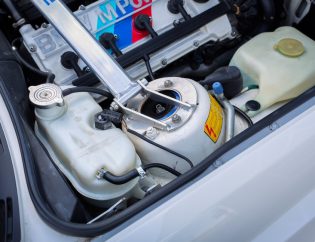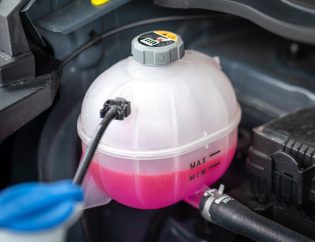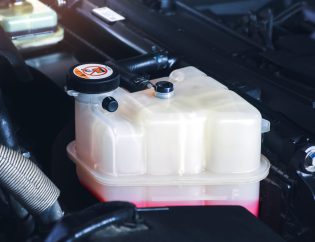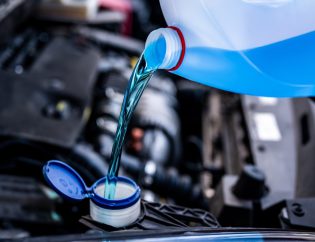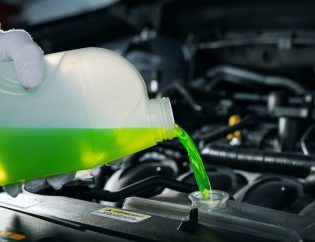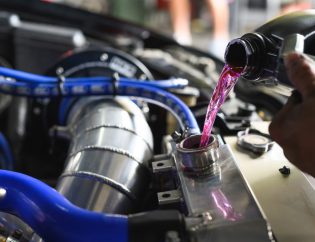
This solution, called coolant or antifreeze, is crucial for keeping your engine from overheating when it gets too hot during long road trips or other driving conditions such as heavy traffic or high altitudes where there isn’t enough oxygen for combustion engines like ours. Learn more in this blog by Azure Chemical.
What Is Coolant?
A liquid called coolant circulates through the engine to maintain its temperature.

It is also referred to as antifreeze and is composed of ethylene glycol and water to keep the coolant from freezing.
There are different types of coolants available today, each with their properties and purposes:
Mineral/Water-Based Coolants
These are cheap but not as effective in cold temperatures; they don’t offer any protection against corrosion or cavitation (a process where bubbles form in your system). They’re also less environmentally friendly than other options because they contain harmful metals like lead, mercury, and cadmium.
Organic Acid Technology (OAT)
This type uses organic acids instead of phosphates to prevent corrosion.
Ethylene Glycol (EG)/Alcohol Blends
These give better protection against cavitation than mineral/water-based fluids; however, they can cause corrosion if used improperly.
Hybrid Organic Acid Technology (HOAT)
This type combines OAT technology with an alcohol blend for improved performance–it works well in both hot climates as well as colder ones
Types of Coolant Solutions
There are four types of coolant solutions:

Distilled Water
Distilled water is pure, but it’s also not good for your cooling system. Distilled water has no minerals or salts, which means it doesn’t conduct electricity very well. This makes it a poor choice for use in automotive cooling systems because they need to be able to dissipate heat effectively through their hoses and radiators (which carry hot coolant).
Engine Coolant
Ethylene glycol and water are combined to make engine coolant. Water’s freezing point is lowered by ethylene glycol, an alcohol-like substance, enabling it to stay liquid even in freezing weather. Although not especially dangerous in tiny amounts, it is hazardous to humans as well (as little as 5 ml can be lethal).
In most cases, mixing different types of coolant will not cause any problems with your car’s engine or cooling system–but there are some exceptions to this rule:
You should flush out all traces before changing again if one kind has been combined with another and then ran through your car’s cooling system (for example, by putting both in at once). This will guarantee that if you switch brands later, there won’t be any residue from one brand over another.
Coolant Additive/Conditioner
Coolant additives are used to keep the coolant in good condition. If you use a quality coolant, you don’t need to use these additives. However, consider using tap or distilled water as your primary coolant. In that case, it is recommended that you add an antifreeze/coolant conditioner product (also known as “purple” or “green”) to your system every two years.
This can help remove rust and scale from the cooling system by breaking down minerals in hard water so they do not build up on surfaces inside your engine block or radiator core and prevent corrosion of metals when mixed with regular unleaded gasoline.
Antifreeze
Antifreeze is a chemical solution that keeps your car’s engine cool. It can be made from water, ethylene glycol, and other chemicals. Antifreeze comes in two forms: straight and diluted with water (50/50 mix). Some vehicle manufacturers recommend using the straight version of antifreeze in their vehicles, while others require a 50/50 mix of antifreeze/water for optimal performance. If you’re unsure what type of antifreeze is recommended for your vehicle or want to know more about how it works, consult your owner’s manual before buying any automotive coolant product.
Mixing Coolant Type
You can mix different types of coolant.

However, it’s important to understand that you should not mix water with antifreeze or engine coolant with coolant additives/conditioners.
When mixing two types of coolants, be aware that some manufacturers recommend different ratios for the two fluids. In general, if you are replacing only one gallon (4 liters) of your current solution with another type of fluid from a different manufacturer–or if you are adding more fluid to an existing system–it’s best to follow the recommended ratio for mixing purposes.
FAQ
What Is Coolant and Why Is It Important for My Vehicle?
Coolant, also known as antifreeze, is a liquid that helps regulate your vehicle’s engine temperature. It prevents the engine from overheating in summer and freezing in winter.
Are There Different Types of Coolant?
Yes, there are mainly three types: Inorganic Acid Technology (IAT), Organic Acid Technology (OAT), and Hybrid Organic Acid Technology (HOAT). Each type has different chemical compositions and properties.
Can I Mix Different Types of Coolant?
Generally, it is not recommended to mix different types of coolant. Mixing can lead to reduced effectiveness, potential chemical reactions, and damage to the cooling system.
What Are the Risks of Mixing Coolants?
Mixing can cause clogging, corrosion, and reduced heat transfer efficiency. It may also lead to premature engine wear and failure.
Conclusion
It is not a good idea to mix coolants. The mixture you use should be one that your car’s manufacturer suggests because it will keep your engine operating at its best and protect it from overheating damage. Want more information regarding coolant solutions? Request a quote from Azure Chemical today.

